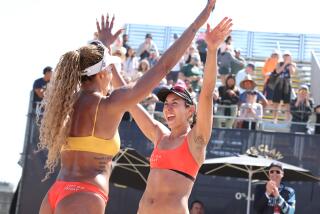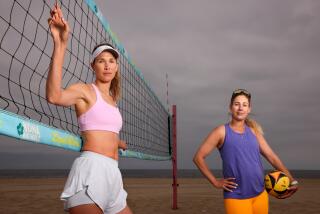PRO VOLLEYBALL : A Womanâs Purse Is a Paltry Prize When You Look at the Cash Men Carry Home
The state of womenâs professional beach volleyball is best illustrated by the finances of Mike and Patty Dodd, the first couple of the sand courts.
Late last week, the Dodds said their goodbys, then Mike and partner Tim Hovland--the top money-makers on the menâs tour--flew to Boulder, Colo., and won a weekend tournament sanctioned by the Assn. of Volleyball Professionals. Meanwhile, Patty and her partner, Jackie Silva, were continuing their dominance of the womenâs tour, winning a Womenâs Professional Volleyball Assn. event in Huntington Beach.
Back in their El Segundo home on Monday, the Dodds could relax, swap stories about their successful forays and enjoy the fruits of victory.
For Mike, it was a check for $25,000. For Patty, it was $1,852.
Such is life on the womenâs pro tour, which stops at the Manhattan Beach pier Saturday and Sunday for the John Shaw Open. Amid the publicity given the six-figure incomes generated on the menâs circuit, the top female beach players in the world continue to toil for a fraction of the prize money available to their male counterparts.
âIf you get eighth place, itâs not enough to cover the air fare to Florida and your accommodations,â said Malibu promoter Scott Hubbell, who is in his third season as director of events and promotions for the WPVA. âThe womenâs tour has been in its embryo stages. Now, itâs just starting to be born.â
The birthing process began with cable televisionâs growing interest in the womenâs game, said Hubbell, who adds that womenâs tournaments have consistently beaten the menâs events in the TV ratings game. Plus, the money has increased steadily from $5,000 purses two years ago to $10,000 last year to $15,000 this year.
Hubbell and several others close to the tour say the women are about at the point the men occupied five years ago--a promising assessment since the winnings of the top male players have ballooned more than 400% in that period.
So the womenâs tour is on the brink of something. But no one is sure exactly what.
The best hint is the hiring of sports attorney Leonard Armato as the WPVA counsel. Armato, a former top beach player who now represents athletes like Kareem Abdul-Jabbar and Phoenix Suns guard Kevin Johnson, is the man credited with organizing the AVP and catapulting the menâs game into the big time.
Armato says he sees much promise, calling volleyball âclosely analogous to tennisâ in terms of potential growth as a womenâs sport. âI think womenâs volleyball is every bit as attractive as any womenâs sport,â he said. âThey just came to me this year and right now Iâm ferreting out various things and trying to get a handle on the situation.â
But for promoters of the 15-event womenâs tour, the new marriage of Armato and the WPVA looks like a storm warning. The battle cry when the players wrested complete control of the menâs tour was âcut out the middle man.â Translation: Get rid of the promoter. They did just that in 1987 and the AVP began promoting its own events, dealing directly with sponsors rather than paying someone to do it for them.
Itâs a scenario that sounds good to many of the women. âThis is a transition year for us,â said Patty Dodd, who has seen up close how the money has skyrocketed on the menâs tour. (Her husband and Hovland have already earned more than $93,000 apiece with 10 events remaining.) âI think our goal is to have just us and the sponsor and not everybody in the middle. The prize money would be higher, the players would benefit more and it would be better all around.â
That all sounds familiar to Craig Elledge, who worked for Group Dynamics Inc. until 1987, the year the AVP severed ties with the firm after it had promoted the tour for three years. With the entrance of Armato, Elledge--who promotes two WPVA events--began to feel like an endangered species.
âIâve met with Leonard no less than four times in the last month,â said Elledge, who operates his own sports promotion firm in Van Nuys. âIn fact, the second I heard that Leonard was involved, I went in and met with him. Thereâs no question what (Armatoâs involvement) meant.â
For Armatoâs part, he doesnât sound as if heâs in a hurry to run the promoters out of the womenâs game. To the contrary, he says that the structure of the womenâs tour is such that itâs necessary for the WPVA to deal with outside promoters.
âI think they need to contract with a variety of promoters who will be able to get sponsors on a local level,â Armato said. âA promoter does have a certain benefit. He has the organization in place and the expertise in dealing with businesses. If youâre dealing with honest promoters, no one has a problem. But when promoters are pulling the wool over the eyes of the players and exploiting them, thatâs when thereâs a problem.â
Elledge, who promotes womenâs tournaments in Huntington Beach and Hermosa Beach (July 22-23), said he expects Armato to take some control away from the promoters, but it remains to be seen how much. âHe was able to do what he did with the men because he had the money,â said Elledge, referring to beer and tequila companies that guaranteed more than $1 million in prize money for 23 major tournaments.
âBut now he doesnât have the money. I think the womenâs game will be dictated by the Golden Rule--those with the gold will rule. Whoever has the money will win the control.â
The result, Elledge said, has been a giant scramble to find the womenâs âsugar daddyâ--that one big sponsor who will be able to pump enough money into the tour to increase the potential winnings and prestige.
âThat sugar daddy is out there,â he said. âAnd whoever gets there first will be in control. The women have already proved that they have a good game, a marketable game. Someone is out there who will put the money behind it.â
Hubbell, a promoter of beach events who has business ties to beer companies and other major sponsors, has his doubts about the existence of a sponsor big enough to bankroll the womenâs tour. His belief has not been received favorably by some of the women on the WPVA board.
âI didnât always agree with their inflated perception of the market-ability of the sport,â said Hubbell, who is also promoting four womenâs events this year as well as working for the WPVA. âIâve been out there pounding the pavement and itâs not an easy sell.â
It has been speculated that those differences with the WPVA leadership prompted the women to seek Armatoâs assistance. But Hubbell, who says he is prepared to quit his job with the WPVA in favor of continuing to promote the more prestigious womenâs tournaments, thinks a big sponsor might be lured to the sport if increased television coverage convinces executives that the visibility will help their product.
âI think whatâs happening is that the people who have the money to spend--the beer companies, car companies, cosmetic companies--are not educated or aware of the womenâs game because there has not been the media coverage,â Hubbell said.
âNow, because of television, the possibility of sponsorship is better. But if 500 people show up to a tournament and itâs not on television, and the tournament cost the sponsor $40,000 to put on, the company is going to put its money in more conventional advertising efforts.â
More to Read
Go beyond the scoreboard
Get the latest on L.A.'s teams in the daily Sports Report newsletter.
You may occasionally receive promotional content from the Los Angeles Times.










